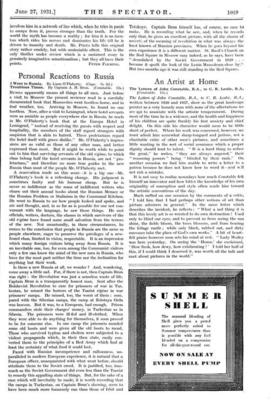Personal Reactions to Russia
I Went to Russia. By Liam a-Flaherty. (Cape. 7s. 6d.) Tioublous Times. By Captain A. H: Brim. (Constable. 12s.) Russia apparently means all things to all then. Juit before ayisit, to Moscow the present reviewer read in a carefully documented book that Muscovites went bootless home, and in foul weather, too: Arriving in Moscow, he found no one bootless. Now, after a visit to Leningrad, where hotel servants were as amiable as people everywhere else in Russia, he reads in Mr. O'Flaherty's book that at the Europa Hotel in Leningrad, " instead of receiving the guests with respect and hospitality, the members of the staff regard strangers with suspicion that is akin to hatred. These proletarians regard the hotel itself with grave dislike." Mr. O'Flaherty's impres- sions are as valid as those of any other man, and better expressed than most. But it might be worth while to point out to him that surviving servants of the old regime, to which class belong half the hotel servants in Russia, are not " pro- .letarians," and therefore no more true guides to the new Russia than most of the people Mr. O'Flaherty met.
A reservation made on this score—it is a big one—Mr. O'Flaherty's book is a refreshing change. His judgment is sometimes faulty and his humour cheap. But he is -never so indifferent as the mass of indifferent writers who churn out their annual books about the -Russian Menace or the Russian Problem or Stalinism in the Communal Kitchen. He went to Russia to -see how people looked and spoke, and ate and thought, and, in so far as is possible for one not con- versant with • the language, he saw those- things. He met officials, writers, doctors, the classes in which survivors of the • old regime have found some small salvation from the terrors of the new. Not unnaturally, in these circumstances, he comes to the conclusion that people in Russia are the same as people elsewhere, eager to preserve the privileges of a new- found class, limited in vision; respectable. It is an impression which many foreign visitors bring away from Russia. It is an inevitable one, too, for even among the Communist visitors only a few can know the mind of the new men in Russia, who have for the most part neither the time nor the inclination for anything but their work.
Is there a new Russia at all, we wonder ? And, wondering, come away a little sad. For, if there is not, then Captain Brun was right : the Revolution was just a senseless waste of life. Captain Brun is a transparently honest man. Sent after the Bolshevist Revolution to care for prisoners of war in Tur. kestan, he missed the horrors of the Tsarist regime in war prisoners' camps. He missed, too, the worst of them : corn. pared with the Siberian camps, the camp at Zolotaya Orda was heaven. But it was, to a European, bad enough. Prison commanders stole their charges' money, in Turkestan as in Siberia. The prisoners were ill-fed and ill-clothed. When they were able to do anything for themselves, it soon proved to be for someone else. In one camp the prisoners mended some old boots and were given all the old boots to mend.
Those who survived typhus and cholera were subjected to a . - violent propaganda which, in their then state, easily con- • Verted them to the principles of a Red Army which had at least the certainty of what food it could loot.
Faced With Rtisisian incompetence and callousness, un- paralleled in modem European experience, it is natural that a European officer, unacquainted with what went before, should attribute them to the Soviet creed. It is justified, too, inas- much as the Soviet Government did even less than the Tsarist to remedy this appalling state of things. But, for the sake of a case which will inevitably be made; it is worth recording that the camps. in Turkestan, on Captain Brim's showing, seem to have been much more humanely run than those of Irbit and Totskoye. Captain Brun himself has, of course, no case to make. He is recording what he saw, and, when he records only that, he gives an excellent picture, with all the charm of naivete, of the meaning of revolution in what was always the least known of Russian provinces. When he goes beyond his own experience it is a different matter. St. Basil's Church on the Red Square in Moscow may indeed, as he says, have been " demolished by the Soviet Government in 1929. . • because it spoilt the look of the Lenin Mausoleum close by." But two months ago it was still standing in the Red Square.






































 Previous page
Previous page